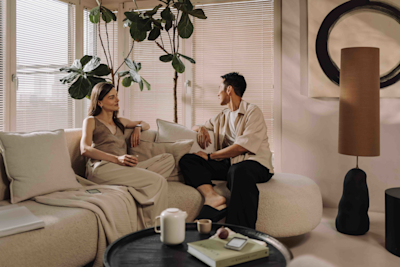
Essentialism vs. Minimalism: Paths to an Intentional Life
The journey to simplicity
It’s no secret that our world is brimming with options, activities, and an endless stream of material possessions.
How do we sift through the chaos to find what truly matters?
Enter the realms of essentialism and minimalism—two philosophies that challenge the status quo by stripping life down to its bare essentials.
While both paths champion simplicity and intentionality, they approach the pursuit of a meaningful life from slightly different angles.
At Mudita, we’re staunch advocates of both minimalism and essentialism, and our product line reflects these transformative philosophies.
That’s why we believe the nuances between essentialism and minimalism are worth exploring, in order to help you navigate which philosophy might resonate more deeply with your personal goals and values.
Whether you're looking to declutter your home or prioritize your commitments, understanding these two concepts can be your first step towards living a more focused and intentional life.
While essentialism and minimalism share some similarities, there are distinctions between the two concepts:
Essentialism:
Focus is on removing the non-essentials to make space for what's truly vital
Emphasis is on being selective and disciplined about where you dedicate your time, energy and resources
It's about pursuing only the core essentials that align with your values and goals
Can be applied to various areas of life - work, relationships, possessions, commitments etc.
Prioritizing is key - separating the vital few from the trivial many
Minimalism:
Primary focus is on reducing material possessions and physical clutter
Embracing a lifestyle with less stuff, simple living spaces and minimal consumerism
While it can extend to other areas, minimalism's roots are in physical possessions
Often associated with decluttering, downsizing and living with just the essentials
Motivation can be to reduce environmental impact, increase freedom, or simplify life
So, in essence, essentialism is a broader philosophy about pursuing only the core essentials across all life domains - not just material possessions. Minimalism, on the other hand, is more narrowly focused on the material aspect of life by reducing physical clutter and possessions.
Essentialism requires being highly selective about where you devote your time, energy and resources holistically. Minimalism specifically emphasizes owning and consuming less physical stuff.
That said, there can be overlap. Practicing minimalism can enable an essentialist lifestyle by removing non-essential material distractions. An essentialist may embrace minimalist principles for their possessions to create space for what's essential.
While essentialism and minimalism are distinct concepts, they do share some key similarities:
1. Simplicity
Both philosophies promote a simpler way of living by removing the non-essentials, excess, and clutter from your life. They encourage identifying what is truly necessary and valuable.
2. Intentionality
Essentialism and minimalism require being very intentional about how you spend your time, energy, money, and what you allow into your life. They discourage mindless accumulation and busyness.
3. Focus
By eliminating the non-essentials, both approaches help create more focus, clarity and mental space to devote to what really matters to you.
4. Freedom
Letting go of excess possessions, commitments, and distractions cultivates a sense of freedom - from clutter, overwhelm, and the burden of maintaining non-essential things.
5. Present living
Minimalism and essentialism emphasize being present and living in the moment rather than constantly accumulating and pursuing more stuff or busyness.
6. Self-awareness
Adopting either lifestyle requires deep self-awareness about your values, priorities, and what is truly adding value versus draining you.
7. Sustainability
Both philosophies can contribute to a more sustainable way of living by reducing over-consumption, waste, and depletion of resources.
Final Thoughts
In essence, essentialism and minimalism are kindred spirits in promoting more simplified, intentional ways of living aligned with your core values by stripping away the non-essentials.
At Mudita, we embrace the philosophies of essentialism and minimalism in everything we do—from our products to our workplace culture and the way we live our lives. We believe that by focusing on what’s truly important and letting go of the rest, we can create a more meaningful, fulfilling existence.
Mudita Bell Classic Alarm Clock
Essentialism guides us to focus relentlessly on what is absolutely essential, ignoring the noise and excess that distract from our true purposes. Similarly, minimalism encourages us to embrace simplicity in design and functionality, eliminating unnecessary elements to enhance user experience and personal engagement.
Together, these philosophies empower Mudita to create products that not only serve practical needs, but at the same time, also promote a lifestyle of greater intentionality and decreased clutter.
This dual commitment reflects our dedication to fostering a culture where every product and decision is aligned with the essential, promoting a life focused not on having more, but on being more.
Related stories

Mindful tech use & the key to a healthier, happier brain
Overstimulation from screens is reshaping your brain, it harder to focus & stress more. Learn practical ways to reset, regain clarity & use tech more mindfully.

The Digital Detox Guide for Better Sleep
Struggling with poor sleep? Discover how a digital detox can improve sleep quality, support better sleep hygiene, and help you sleep better naturally.

Embracing Mindful Technology for Better Relationships
Reduce screen time, improve communication, and build deeper connections with mindful tech. Discover tips for a more present, meaningful life.
If you'd like to receive the best stories from our blog, keep up to date with our progress and get notified about our product releases and special discounts.